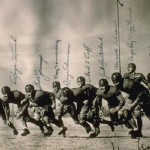 Marquette University eliminated its varsity football team in 1960, and the heroics of the Golden Avalanche, Hilltoppers, and Warriors (as the team was variously known) are now dimly remembered, if at all. There was a time, however, when Marquette produced a steady supply of players for the National Football League. Beginning in 1920, a total of 70 former Marquette players found their way into at least one NFL game.
Marquette University eliminated its varsity football team in 1960, and the heroics of the Golden Avalanche, Hilltoppers, and Warriors (as the team was variously known) are now dimly remembered, if at all. There was a time, however, when Marquette produced a steady supply of players for the National Football League. Beginning in 1920, a total of 70 former Marquette players found their way into at least one NFL game.
The first Marquette alumnus to play in the NFL was Edward Lewis “Bo” Hanley, a Milwaukee native who played wingback for the Detroit Heralds in 1920, the league’s inaugural season when it was known as the American Professional Football Association. The 5’7”, 150 pound Hanley was born in Milwaukee in 1887, and was thus 33 years old during the 1920 season, his only year in the NFL. When the Green Bay Packers entered the NFL in 1921, their center was 29-year old Marquette alumnus, Richard John Murray, the second Marquette student to play in the NFL. “Jab” Murray, as he was known, was a native of Ocanto and was 6’1” tall and weighed a hulking 219 pounds.
The last Marquette player to join the NFL ranks was defensive back John Martin Sisk, Jr. who played for the Chicago Bears in 1964. Sisk—whose father starred at Marquette in the 1920’s and with the Bears in the 1930’s—had played at Marquette as a freshman and then had transferred to the University of Miami when the school dropped football. The last two Marquette football players to appear in the NFL were Minnesota Viking safety Karl Kassulke, who transferred to Drake University after Marquette dropped football and who entered the NFL in 1963, and Dallas Cowboy defensive lineman, George Andrie, who remained at Marquette for his senior year after the school dropped football and was then drafted by the Cowboys. Both Kassulke and Andrie appeared in the Pro Bowl during their careers—Andrie did so on five occasions–and both appeared in the Super Bowl, albeit on the losing side. Both players retired after the 1972 season.
However, the greatest of the Marquette alumni in the NFL was clearly LaVern “Lavvie” Dilweg, who played left end for the Milwaukee Badgers and the Green Bay Packers from 1926 to 1934, winning first team all-pro honors six times.
The 6’3,” 200 lb., Dilweg was born in Milwaukee in 1903. He grew up in city of his birth and was a star football player at Washington High School in the late 1910’s and early 1920’s. He continued his football career at Marquette where he won All-American honors as an end who played both defense and offense.
After two years in the college, Dilweg enrolled in the Marquette Law School from which he graduated in 1927. The diploma privilege had not yet been extended to Marquette, but Dilweg took, and successfully passed, the bar exam during the summer following his graduation. Having exhausted his college football eligibility prior to his third year of law school, Dilweg played for the NFL’s Milwaukee Badgers while attending law school during the 1926 season.
Dilweg was one of five former Marquette players on the Badgers roster that season. Unfortunately, the professional Badgers, who featured eight rookie starters, were generally outclassed by their opponents in 1926. The team finished with a record of 2-7, and folded before the official end of the season, bringing to a close Milwaukee’s official presence in the NFL.
In 1927, Dilweg signed with the Green Bay Packers and at the same time began the practice of law in Green Bay where he was to reside for the rest of his life. During Dilweg’s years with the team, the Packers were one of the premier teams in the NFL, and he was one of its top stars. After finishing second in 1927, and fourth in 1928, the Packers reeled off three consecutive NFL championships, and would have won a fourth in 1932, but for the NFL rule that ties did not count in the standings. In 1932, Green Bay finished 10-3-1, but lost the title to the 7-1-6 Chicago Bears. (Under modern rules, which treat ties as a half-win and half-loss, Green Bay would have been awarded the 1932 championship.) Between 1929 and 1932, the Packers were a combined 44-7-3, with an undefeated 12-0-1 season in 1929.
In 1933, the NFL was divided into two divisions and the Packers level of play declined somewhat. In both 1933 and 1934, they finished third in the NFL’s Western Division. At the end of the 1934 season, Dilweg retired from football at age 31 to devote himself to his law practice and his other business interests. He did, however, keep his hand in the sport by refereeing Big Ten football games on a regular basis until 1943.
In addition to his law practice, Dilweg was involved in the construction industry in Green Bay, as well as numerous other business and civic activities. He served as a director of the Green Bay Blue Jays baseball team which was a member of the Class D Wisconsin State League, and from 1934 to 1943, he was in charge of the Green Bay Home Owners Loan Corporation (HOLC), a New Deal housing agency.
A strong supporter of Franklin Roosevelt, Dilweg was active in Democratic Party politics in Wisconsin. In 1943, he was elected as a Democrat to the United States House of Representatives from Wisconsin’s 8th District. His election marked only the third time since 1848 that the voters of Green Bay’s district had elected a Democrat to Congress. By all accounts his celebrity as a former Green Bay Packer star contributed to his victory. In the House, he served with a former Marquette Law School classmate, John B. Bennett of Michigan (’25), who was also elected in the fall of 1942.
Unfortunately for Dilweg, his stint in the House of Representatives turned out to be only a single two-year term as he went down to defeat with President Franklin Roosevelt as the Republican Party carried Wisconsin in the 1944 elections. (Ironically, Bennett, a Republican, was also defeated in 1944, but he was later returned to Congress for nine additional terms.)
After leaving Congress , Dilweg resumed the practice of law in Green Bay but also maintained an office in Washington, D.C. In 1961, he was named by President Kennedy as a member of the Foreign Claims Settlement Commission. Dilweg died in Florida in 1968, just prior to his 65th birthday. He is a member of the Green Bay Packers Hall of Fame, and his grandson, quarterback Anthony Dilweg, played in the NFL from 1989 to 1991 and with the Packers from 1989 to 1990.
The photo accompanying this post is of the Marquette Golden Avalanche preparing to play in the first Cotton Bowl in 1937.
 As my colleague Rebecca Blemberg recently blogged about, California has moved in the direction of recognizing a right to counsel for civil litigants with critical legal needs.
As my colleague Rebecca Blemberg recently blogged about, California has moved in the direction of recognizing a right to counsel for civil litigants with critical legal needs.
 Marquette University eliminated its varsity football team in 1960, and the heroics of the Golden Avalanche, Hilltoppers, and Warriors (as the team was variously known) are now dimly remembered, if at all. There was a time, however, when Marquette produced a steady supply of players for the National Football League. Beginning in 1920, a total of 70 former Marquette players found their way into at least one NFL game.
Marquette University eliminated its varsity football team in 1960, and the heroics of the Golden Avalanche, Hilltoppers, and Warriors (as the team was variously known) are now dimly remembered, if at all. There was a time, however, when Marquette produced a steady supply of players for the National Football League. Beginning in 1920, a total of 70 former Marquette players found their way into at least one NFL game. One of this Law School’s most noteworthy legacies is its production of many of the region’s most outstanding trial lawyers. The legacy was fully evident on Friday, November 6, 2009 at the Civil Trial Evidence and Litigation Conference. The sold-out event served as a “last call for Sensenbrenner Hall” of sorts while featuring a panel that well-represented the many fine trial lawyers who have distinguished themselves as Marquette lawyers. It was my privilege to help organize the conference along with Pat Dunphy (L’76), who conceived of the idea and was the key to assembling the talented panel of Marquette alumni. In light of Friday’s success, Pat and I have already begun discussing next year’s civil litigation conference, which will be held in the Law School’s new venue in Eckstein Hall.
One of this Law School’s most noteworthy legacies is its production of many of the region’s most outstanding trial lawyers. The legacy was fully evident on Friday, November 6, 2009 at the Civil Trial Evidence and Litigation Conference. The sold-out event served as a “last call for Sensenbrenner Hall” of sorts while featuring a panel that well-represented the many fine trial lawyers who have distinguished themselves as Marquette lawyers. It was my privilege to help organize the conference along with Pat Dunphy (L’76), who conceived of the idea and was the key to assembling the talented panel of Marquette alumni. In light of Friday’s success, Pat and I have already begun discussing next year’s civil litigation conference, which will be held in the Law School’s new venue in Eckstein Hall.